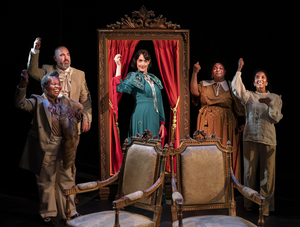Review: THE PARADIS FILES, Southbank Centre
This new opera by Graeae tours the country until 12 May.

![]() Plays, musicals and operas which focus on women from history have become pleasingly commonplace over the last few years, but new touring opera The Paradis Files not only tells the story of a forgotten female contemporary of Mozart, but also puts her disability front and centre.
Plays, musicals and operas which focus on women from history have become pleasingly commonplace over the last few years, but new touring opera The Paradis Files not only tells the story of a forgotten female contemporary of Mozart, but also puts her disability front and centre.
Graeae, the theatre company behind the opera, aims both to address the problem of disabled representation, by spotlighting the so-called 'Blind Enchantress' Maria Theresia von Paradis, and to make the theatre a truly inclusive place for the disabled community.
It is clear from the start of the performance that Graeae have considered the experiences of the 18th century and equally of contemporary disabled audience members. Not only is composer and pianist von Paradis portrayed by a singer (Bethan Langford, giving a performance that is both emotionally affecting and vocally powerful) who proudly declares herself also to be visually impaired, but the production also uses a variety of conceits in order to be accessible to all.
In lieu of an overture, the opera begins with an extensive introduction to cast, band and BSL interpreters, who each describe their physical appearances (as well as that of the set and props) for the benefit of the visually impaired, with a comic script that is occasionally corny but nevertheless eye-opening as to the possibilities of theatrical audio description. Throughout the show, an SATB chorus of 'Gossips', commenting with alternating glee or horror on the deteriorating relationship between von Paradis and her mother, provides a method of audio description rooted in the Greek chorus motif which never detracts from the main action.
The choice of subject matter itself certainly does not lack for dramatic potential in Selina Mills and Nicola Werenowska's libretto - a quick-moving plot covers von Paradis' nascent musical talent and success, her love affair with Mozart and implied sexual exploitation by Salieri, and her traumatic forced abortion, all seen through the lens of her troubled relationship with her parents, especially her mother.
Particularly revelatory are the visceral scenes of misguided medical attempts to 'cure' von Paradis' blindness (the show puts a welcome emphasis on how disabled people do not need to be 'fixed' to be successful), realised through an effective combination of physical theatre and a jarring use of a vocal quartet in the style of Mozart's comic operas.
This is just one memorable moment from Errollyn Wallen's score, which uses unconventional instrumentation (including an accordion and drum kit) and incorporates motifs from folk and pop as well as from von Paradis' better-known male contemporaries, and from the few surviving compositions by von Paradis herself.
With such promising source material and score, however, the libretto itself is sometimes disappointing. Despite some more poetic moments, the lyrics too often fall into the trap of telling instead of showing. Von Paradis' utterance of "they think they know me / but they don't know me" stands out as a particularly prosaic example.
Moreover, for an opera that laudably takes a fresh approach to disability, it is somewhat disheartening that the main body of the plot still revolves around tropes already widely used in historical drama. The librettists resort to overdone plot devices such as the social shame of a pregnancy out of wedlock and the disappointment of a father upon not having a son, which do not reflect the facts of von Paradis' life and potentially undermine the show's message of focussing on and celebrating a woman's achievements. It is also worrying that potentially triggering themes such as baby loss and sexual assault are not anywhere alluded to in the show's marketing materials.
The Paradis Files could thus perhaps benefit from a shift in focus, but nonetheless is promising in its choice to highlight a fascinating woman from classical music history, and to take tangible steps in making a traditionally inaccessible art form both inclusive to those who have disabilities and engaging to those who do not.
The Paradis Files continues on tour
Image credit: Patrick Baldwin
Reader Reviews

Videos
